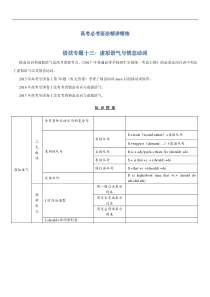 DOC
DOC
【文档说明】高考必考语法精讲精练专题十三:虚拟语气与情态动词 Word版含解析.doc,共(7)页,118.000 KB,由MTyang资料小铺上传
转载请保留链接:https://www.ichengzhen.cn/view-74827.html
以下为本文档部分文字说明:
高考必考语法精讲精练语法专题十三:虚拟语气与情态动词情态动词和虚拟语气是高考重要考点,《2017年普通高等学校招生全国统一考试大纲》附录语法项目表中列出了虚拟语气以及情态动词。2015年高考全国卷Ⅰ第79题(短文改错)考
查了情态动词must后面接动词原形。2016年高考全国卷Ⅰ没有考查情态动词与虚拟语气。2017年高考全国卷Ⅰ没有考查情态动词与虚拟语气。知识框架虚拟语气三大板块含有条件状语从句的复合句名词性从句宾语从句S.+wish(wouldrather)+宾语从句S.
+suggest(demand…)+宾语从句主语从句Itis+adj./p.p/n.+that+S+(should)+do表语从句S.+isthat+s.+(should)+do同位语从句S.+that+s.+(should)+do定语从句Itishigh/abouttime
that+s.+shoulddosth.(didsth)两种形式1.时态后退型用一般过去表示现在用过去完成表示过去用过去将来表示将来2.should+动词原形型一.含有条件状语从句的复合句(以do为例;S=主语)例如:①IfIwereyou,Iwoul
dapplyforthejob.②IfIhadthemoney,Iwouldbuyit.③IfIweregivenanotherchance,Iwoulddoitbetter.④IfIhadtakeny
ouradvice,Iwouldhavemadegreatprogress.⑤Ifithadnotbeenforyourhelp,Iwouldn’thavefinishedtheworksoeasil
y.⑥Ifitshouldraintomorrow,Iwouldstayathomeallday.⑦Ifyouweretocometomorrow,Icouldwaitforyouathome.注意:在书面语中,条件从
句可以不用连词if,而将谓语中的were,had或should等移至主语之前构成倒装句。例如:①WereIyou,Iwouldapplyforthejob.②HadItakenyouradvice,Iwouldhavemade
greatprogress.③Shoulditraintomorrow,Iwouldstayathomeallday.二、错综时间的条件句虚拟条件句中的主句和从句涉及的动作发生的时间不一致,这时主句和从句的谓语形式应按照各自动
作发生的实际时间来表达。例如:①Ifyouhadn'twatchedTVyesterday,youwouldn'tbesosleepynow.(从句yesterday说明过去,主句now说明现在)②Iftheyhadleftho
meearlythismorning,theywouldarriveinhalfanhour.(从句说明过去,主句说明将来。)③Ifyouhesitatedthismoment,youmightsufferinthefuture.(从句说
明现在,主句说明将来)三、含蓄条件句非真实条件句中的条件从句有时不表达出来,只暗含在上下文中,这种句子叫做含蓄条件句。含蓄条件句有三种情况:1.条件暗含在单词短语中:常见介词有with假如有,without假如没有,butfor要不是因为;连词有or/other
wise(前句用陈述语气,后句用虚拟);but(前句为虚拟,后句陈述)例如:①Hewouldnotgetsucharesultwithoutyourhelp.(条件暗含在介词短语withoutyourhelp=ifyouhadn’thelpedhim中)时间条件
状语从句主句现在If+S+did(were)S+would/should/could/might+do过去If+S+haddoneS+would/should/could/might+havedone将来did(were)If+SshoulddoweretodoS
+would/should/could/might+do②Butforyou,Icouldnotberecoveredsosoon.(条件暗含在Butforyou=Ifyouhadn’thelpedme中)③Hemusthave
beenthere,orhenevercouldknowtheplacesowell.(暗含条件是连词or;后句为虚拟)④Iwouldhavebeentoyourplace,butIwasreallytoobu
sy.=Iwasreallytoobusy,or/otherwiseIwouldhavebeentoyourplace.⑤Shewasill,otherwiseshewouldhavebeenpresentattheme
eting.(条件通过连词otherwise/or表示出来Ifshehadnotbeenill...)2.条件可根据上下文推理出①Theycouldhavewon.(条件可能是iftheyhadbeenpatient)②Su
chmistakescouldhavebeenavoided.(条件可能是ifyouhadbeenmorecareful)③Whydidn'tyoutellmeaboutitIshouldhavehelpedyou.(条件可能是if
youhadtoldmeaboutit)④--Didyougotoseehimyesterday?--Iwouldhave,butsomeonecometovisitme.(条件是ifnoonehadco
metovisitme)3.条件用其他形式来表示①Supposeyouwereinmyshoes,whatwouldyoudo?(用suppose/supposing/providing等词表示if)②Totalkwithher,youwouldkno
wshecouldnothearwell.(不定式有假设的意思,相当于Ifyoushouldtalkwithher...)③Lefttohimself,hecouldnothavefinishedthework.(动词的-ed形式表示条件Ifhehadb
eenlefttohimself...)二.虚拟语气用在宾语从句中sb.did(were)…(表现在)1.wish+thatsb.haddone…(表过去)sb.would/coulddo…(表将来)例如:①IwishIknewhisaddress.②Iwishhehadn’t
beenrudetohisparents.③Hewisheswewouldgowithhim.2.wouldrather后的从句要用虚拟语气。例如:①I’dratheryoupostedtheletterrightaway.(现在)②I’dratherIhadn
’tsaidsuchunkindthingstoyou.(过去)③I'dratheryoucameherefortheanswertomorrow.(将来)3.表示“坚持、建议、决定、要求、命令”(“坚决要命”)等主观意向的动词之后的宾语从时间从句对现在的虚拟were,did(一
般过去时)对过去的虚拟haddone(过去完成时)对将来的虚拟were,did(一般过去时)句,谓语用should+do,should可省略(注意:被动语态用should+be+done)。这类词有:insist,suggest,advise,reco
mmend,propose,decide,determine,demand,request,require,desire,order,command等。例如:①TheexpertproposedthatTVshouldbeturnedoff
atleastonehoureveryday.②Experimentsdemandthataccuratemeasurementsbemade.③Sheinsistedthatweshouldtakeupthematt
eratthemeeting.注意:1.suggest表示“暗示、表明”时,用陈述语气。2.insist表示“坚持说、坚持认为(某个事实)”时,用陈述语气。例如:①Yourpalefacesuggeststhatyouareill.②Heinsistedthathehadn’tsto
lenthemoney.三.虚拟语气用在主语从句中Itisdemanded/necessary/apity+that…等结构的主语从句,谓语动词用shoulddo,should可省略。(注意:被动语态用shou
ld+be+done)。It+be可用的词有三类thatS+(should)dosuggested,ordered,required,proposed,demanded,requested,insisted等(“坚决要命”)important,necessary,natural,s
trange等apity,ashame,nowonder等例如:①Itisrequiredthatthestudentsshouldnotusemobilephonesintheirschool.②It’snecessarythatcollegestude
ntsshouldmasteratleastoneforeignlanguage.四.虚拟语气用在同位语从句中。表示“坚持、建议、决定、要求、命令”(“坚决要命”)等主观意向的名词后同位语从句需用虚拟语气,其表达形式为sho
uld+do,should可以省略(注意:被动语态用should+be+done)。这类名词常见的有:advice,suggestion,proposal,order,demand,desire,request,requirement,rec
ommendation等。例如:①Hegaveordersthatthework(should)bestartedatonce.②Weareallforyourproposalthatthediscussion(should)beputoff.五.虚拟语气用在表语从句中。表示“坚
持、建议、决定、要求、命令”(“坚决要命”)等主观意向的的名词作主语时,表语从句需用虚拟语气,其表达形式为should+do,should可省略(注意:被动语态用should+be+done)这类名词主要有:ad
vice,suggestion,order,proposal,demand,desire,request,requirement,recommendation等。例如:①Mysuggestionisthatthemayor(should)presenttheprizes.②Hispl
anisthatheshouldpasstheexamfirst.六.虚拟语气用在定语从句中Itis(about/high)time+thatsb.didsth/shoulddosth.(注意:本句型中should不可省略)例如:①It'sabouttimethatwewentho
me.②It’shightimethatweshouldgohome.注:在It/This/That+be+thefirsttime/secondtimethat...句型中,从句中谓语动词用完成时态。例如:①ThisisthefirsttimethatIhavevisitedHon
gkong.②Thatwasthethirdtimethathehadmadethesamemistake.七.虚拟语气用在让步、方式、目的、不用if的条件状语从句中1.在带有evenif/eventhough引导的让步状语从句的主从复合句中,主句和从句都用虚拟语气
,动词形式与含有非真实条件句的虚拟语气相同。例如:①Evenifhehadbeenill,hewouldhavegonetohisoffice.②Iwouldn’tbuyiteventhoughIhadmoney.2.由asif或asth
ough引导的状语从句表示比较或方式时。从句谓语形式为动词的过去式(be用were)或“had十过去分词”。例如:①HetreatedmeasifIwereastranger.②Shetalkedaboutthe
filmasifshehadreallyseenit.3.虚拟语气用在lest(唯恐、免得),forfearthat及incase引导的目的状语从句中。在由lest等引导的目的状语从句中需用虚拟语气,表示“以防,以免”等意思,其谓语动词多由“
should+动词原形”构成,should也可省略。例如:①Hewaspunishedlestheshouldmakethesamemistakeagain.②Hehandledtheinstrument
withcareforfear(that)itshouldbedamaged.③Takesomemoremoneywithyouincaseyoushouldneedit.④Hecanusethecaronconditionthatheshouldreturnittomorrow.八.虚拟语气
用情感语言中Ifonlysb./sth.+时态后退型的谓语。例如:①Ifonlyyouwereherenow.②IfonlyIhadknowntheresultoftheexamination.九.情态动词+havedone的其他用法1.musthavedone:肯定/一定做过(某事)
。例如:①Itmusthaverainedlastnight,forthegroundiswet.②Youmusthavebeenmadtospeaktosuchafool.③Hisi-phonemusthavebeen
stolenbysomeone,hecould’tfinditanywhere.2.can’t/couldn’thavedone:不可能做过(某事);一定没做过(某事)。例如:①Ididn’tseeherinthemee
tingroomthismorning.Shecouldn’thaveattendedthemeeting.②Hecan’thavegoneabroad,Isawhimamomentago.3.may/might/coul
dhavedone:可能做过(某事)。例如:①Hemay/couldhavebrokenupwithhisgirlfriend.②Hemighthavegivenyouhelp,eventhoughhewasbusy.4.may/mightnothavedone:可能没做过(某事)。
例如:①Hemaynothaveseenthatfilm.②Theymaynothaveknownitbeforehand.5.shouldhavedone/oughttohavedone:本来应该做某事(而没做)。例如:①Youshouldh
avefinishedyourworkontime.②IoughttohavegonehomelastSunday.6.should’thavedone/ought’ttohavedone:本不应该做某事(而做了)。例如:①Yo
ushouldn’thaveputyourbookonthebed.②Heought’ttohaveblamedyou,it’snotyourfault.7.couldhavedone:本来可以做某事(而没做)。例如:①Yo
ucouldhavepassedtheexam,youweretoocareless.②HecouldhaveworkedinWuhanaftergraduation,buthedecidedtoworkintheremot
ecountryside.8.needn’thavedone:本来没必要做某事(而做了)。例如:①Youneedn’thavecomesoearly.②Youneedn’thavetakenmyumbrellaonsuchafin
eday.9.wouldhavedone:本来会做某事;就已经......例如:①Hewouldhavecometohelpme,buthewastoobusythen.②IfIhadtakenyouradvice,Iwouldhav
emadegreatprogress.高考短文改错及语法填空分析与训练·虚拟语气与情态动词考点规律分析:短文改错及语法填空对虚拟语气和情态动词的考查主要涉及情态动词的选择、情态动词的否定表达、情态动词后面接动词原形、should+动词原形构成的虚拟语气以及时态后退型的虚拟语气。虚拟语气短文改错及语
法填空真题训练:1.(2016·全国Ⅰ,阅读A)WhenSandraDayO’ConnorfinishedthirdinherclassatStanfordLawSchoolin1952,she________notfindworkatalaw
firmbecauseshewasawoman.2.(2016·全国Ⅱ,短文改错)Wecanchosebetweenstayingathomeandtakingatrip.3.(2016·全国Ⅱ,短文改错)Someclassmatessuggestweca
ngotoplacesofinterestnearby.4.(2016·北京,31)Ilovetheweekend,becauseI________getupearlyonSaturdaysandSund
ays.5.(2016·浙江,17)George________(go)toofar.Hiscoffeeisstillwarm.6.(2015·北京,29)—Can'tyoustayalittlelonger?—It'sgettinglate.Ireal
ly________gonow.Mydaughterishomealone.7.(2015·浙江,4)Itwassonoisythatwe________nothearourselvesspeak.8.(2015·重庆,12)You
________beCarol.Youhaven'tchangedabitafteralltheseyears.9.(2015·陕西,21)You________feelallthetrainingawasteoftime,butI'mahundredpercen
tsurelateryou'llbegratefulyoudidit.10.(2015·四川,2)You________becarefulwiththecamera.Itcosts!11.(2015·福建,27)—Sorry,Mum!Ifailedthejobinterviewa
gain.—Oh,it'stoobad.You________havemadefullpreparations.12.(2015·天津,7)I________haveworriedbeforeIcametothenewschool,
formyclassmateshereareveryfriendlytome.13.(2014·北京,27)________Ihaveawordwithyou?Itwon'ttakelong.14.(2014·湖南,25)—I'vepreparedallkindsoffoodforthepic
nic.—Doyoumeanwe________(not)bringanythingwithus?15.(2014·江苏,31)Itwassadtomethatthey,sopoorthemselves,________bringmefood.16.(2014·江西,30)Lifeisunp
redictable;eventhepoorest________becometherichest.虚拟语气短文改错专项训练:1.ItishightimethatyouleaveforShanghai.2.Shesuggeststhatherbrothernotgoestocolle
ge.3.Thejudgeinsistedthatthespywasputinprison.4.HowIwishIamasstrongasyou.5.Itisnecessarythatthepatientissenttohospitalrightaway.6.Ifhehadn’tbeenca
ughtinthestormyesterday,hewillnotbeillnow.7.IfIamyou,Iwouldgivehimagoodbeating.学习札记:虚拟语气短文改错及语法填空真题训练:I.1.could[根据句意:当桑德拉在法律学习毕业之后,因为她是女人,没能在法律公司找到工
作。]2.chose→choose[考查动词原形。根据语法知识可知,情态动词can后要用动词原形。]3.去掉can或can→should[考查固定表达。suggest表示“建议”,后面的宾语从句要用shoulddo
形式,should可以省略,故答案有两种改法。]4.needn’t[考查情态动词。句意:我喜欢周末,因为每逢周六、周日我不需要早起。]5.can’thavegone[考查情态动词。句意:乔治不可能已经走得太远。他的咖啡温乎。can’thavedone表示对过去否定
的推测,意为“不可能做了……”。]6.must[句意:——你不能再多待一会儿吗?——天要黑了,我真的现在必须走了,我的女儿独自呆在家里。must必须。]7.could[句意:太吵闹了,我们连自己说的话都听不到。can/coul
d表示“能力,能够”。根据前面的was可知,此处要用过去时could。]8.must[句意:你一定是Carol,这些年以来你一点都没变。must一定,表示推测,符合句意。]9.may[句意:你也许会认为所有的
培训都是浪费时间,但是我百分之百的保证你以后会感激你所做的事情。考查情态动词。根据后文的描述可以看出此处培训还没有结束,是一种不肯定的推测语气。]10.must[考查情态动词。句意:你一定要非常小心对待照相机,它很昂贵。此处表示命令语气。]11.should[句
意:——很抱歉,妈妈,我的面试又失败了。——噢,真是太糟糕了,你本应该做好充分准备的。考查情态动词+havedone的意义。根据上句的面试又失败了,可知是对过去事实的虚拟。shouldhavedone本应该做但是没有做。]12.needn't[句意:在来到新学校前我
本不必担心,因为在新学校我的同班同学对我很友好。考查情态动词。needn'thavedone...本不必做的事做了。]13.Can14.needn't15.should16.might虚拟语气短文改错专项训练:1.
leave改为left。Itistime后面的从句动词要用虚拟语气。谓语动词用过去式。2.goes改为go。suggest表示“建议”,后面的宾语从句用虚拟语气。谓语动词用原形。3.was改为be。宾语从句要用虚拟语气。4.am改为were。wish后面的宾语从句需用虚拟语气。5.第二
个is改为be。主语从句要用虚拟语气。6.will改为would。此处要用虚拟语气。7.am改为were。这是一个与现在情况相反的一个假设,要用虚拟语气。
 辽公网安备 21102102000191号
辽公网安备 21102102000191号
 营业执照
营业执照